In zijn leven en werk maakt de bekende presentator Joris Linssen (1966) veel mee en ontmoet hij tal van bijzondere mensen. De levensinzichten die hij daarbij heeft opgedaan heeft hij gebundeld in zijn net verschenen boek Als je met de stroom meegaat, sta je wel stil. ‘Als je durft te kiezen voor avontuur, word je daarvoor beloond.’
Van risico’s nemen word je wijzer
‘Op een nacht, ik was een jaar of 8, hoorde ik in de garage een dierlijk geluid. Al vond ik het eng, ik ging toch op onderzoek uit en zag achter een stapel dozen een man met een enorme baard liggen slapen. Hij bleek een vriend van mijn ouders die twee jaar lang met een huifkar onderweg was geweest. Mijn ouders vonden me de volgende ochtend diep in gesprek met hem, want ik wilde alles weten over wat hij had beleefd.
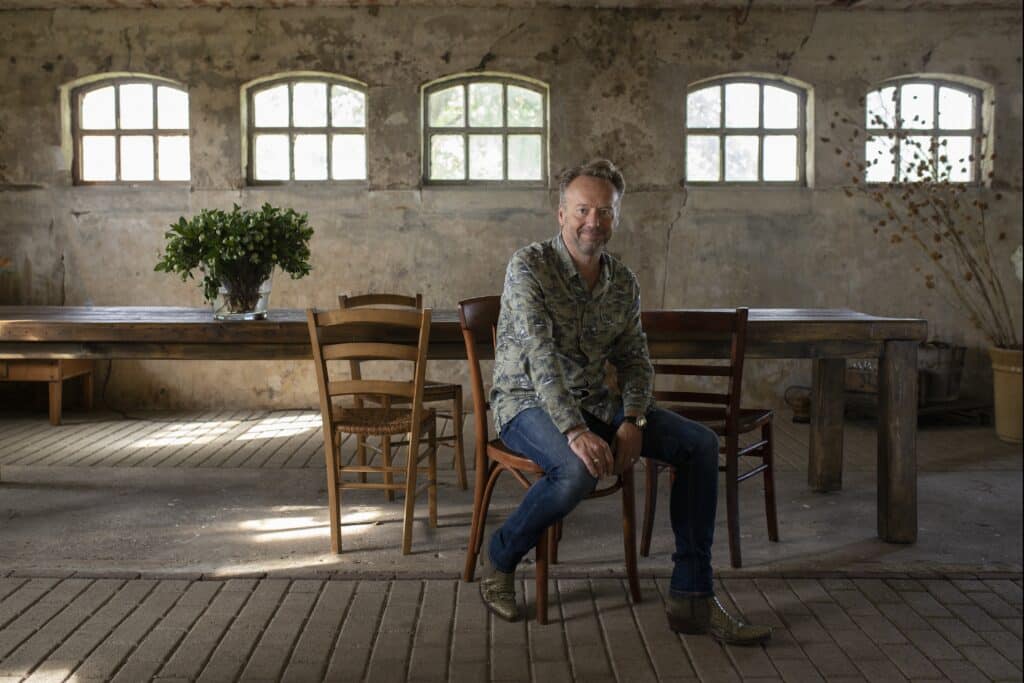
Ik genoot van de bijzondere types met wie mijn ouders zich omringden. Kunstenaars, Dolle Mina’s, hippies, milieuactivisten, mensen in woongroepen. In de jaren zeventig werden kinderen heel vrijgelaten. Ik was de hele dag buiten aan het voetballen met vriendjes en in het weekend gingen we met onze ouders naar het café. Het was de tijd van de vrije liefde, en ook mijn ouders kregen andere partners. Op mijn veertiende gingen ze op een organische en vriendelijke manier uit elkaar. Er ontstonden samengestelde gezinnen en soms gingen we met z’n allen op vakantie.
Ik heb altijd een voorliefde gehad voor mensen die een beetje buiten de maatschappij staan. In Joris’ Showroomportretteerde ik zulke types. Zo ontmoette ik in 2011 Henk Verkaart, die een vriend voor het leven werd. Hij was 70 en woonde met zijn roedel honden in de uiterwaarden van de Waal. Hoewel de stroming door de vrachtschepen heel sterk was, ging hij gewoon zwemmen in de rivier. Levensgevaarlijk, zei ik tegen hem, maar hij legde me uit hoe het moest. “Als je met de stroom meegaat, sta je zelf stil,” zei hij.
Dat intrigeerde me. Maar hoe kon ik erachter komen of het waar was? Alleen door het zelf te doen. Oké, dus ik besloot het risico te nemen en ging de rivier in. Ik werd meegetrokken door de stroom, dreef op mijn rug – het ging bloedhard – en voelde een hemelse rust. Tot hij op zijn vingers floot en ik keihard tegen de stroom in moest zwemmen naar een bepaalde pier, waar ik als door een onzichtbare hand uit het water werd getrokken.
In extase vielen we elkaar in de armen: hij vond het fantastisch dat ik mijn leven in zijn handen had durven leggen en ik vond het te gek dat hij mij zo’n geweldige ervaring had gegeven. Als je met de stroom meegaat, sta je zelf stil – dat is sindsdien eigenlijk mijn levensmotto. Niet te veel afgaan op wat er van je verwacht wordt, maar risico’s nemen en je eigen keuzes durven maken, want alleen daardoor word je wijzer.’
Je kunt verdriet bevrijden uit je lijf
‘Voor mijn televisieprogramma Boeddha in de polder deed ik mee aan een zogeheten mannencirkel. Vooraf zei ik tegen mezelf: ik ga dus écht niet met tien van die mannen die ik niet ken in mijn onderbroek in een kring staan huilen, huggen en oerkreten slaken. Aan zulke sessies doen veel mensen mee die een trauma of probleem hebben, maar dat had ik niet. Dacht ik.
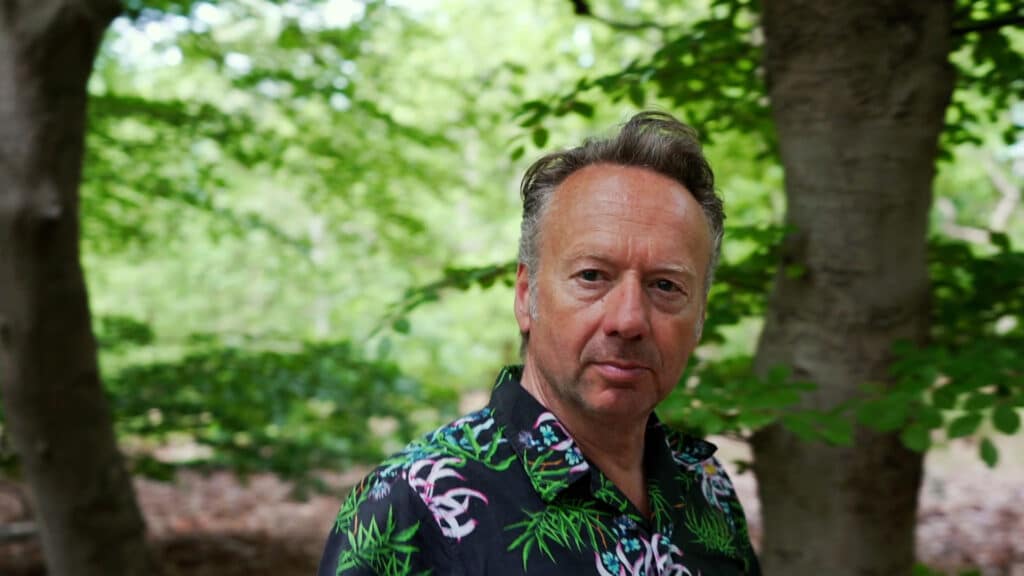
In die periode schreef ik aan Het boek Louis, het levensverhaal van mijn bijzondere stiefvader, van wie ik veel hield. Zijn leven lang was Louis bang voor de dood. Op een gegeven moment – hij was al in de tachtig – was zijn lichaam helemaal op, maar hij kon het leven maar niet loslaten. Op advies van de verplegend arts stemden mijn moeder en Louis’ dochter in met het besluit de behandeling te staken. Louis zou hier nooit goed uit zijn gekomen en we wilden hem allemaal een lijdensweg besparen. Hij kreeg een slaapmiddel en morfine en zou volgens de artsen niet meer wakker worden. Alle apparaten werden afgekoppeld.
Toen hij even later toch nog wakker werd en verschrikt vroeg wat er allemaal aan de hand was, kon ik het hem niet aandoen dat hij als enige niet zou weten dat het uur U was aangebroken. Dus ik vertelde hem dat hij zou gaan sterven. Na de eerste schok gebeurde er iets bijzonders. Het gezicht van die oude man veranderde in dat van een baby en er ontsnapte een oerhuil uit zijn binnenste. Daarna werd zijn blik zacht en ik zag dat hij besefte: dit was het dus, mijn leven is voorbij. Het was intiem en mooi. Louis zoende heel innig mijn moeder en nam afscheid van zijn dochter. Net toen ik dacht dat het mijn beurt was, viel hij weer weg. Daardoor heb ik niet echt afscheid van hem kunnen nemen.
In die mannenkring deden we een ademhalingsoefening van twintig minuten. Kennelijk was het een techniek om opgeslagen verdriet in je lichaam naar boven te halen. Want mijn lijf begon te tintelen, en ineens werd ik overmand door verdriet en kreeg een enorme huilbui. De regisseur van het programma zei naderhand: je leek net een baby. Dat gekke verwrongen gezicht van Louis die even een pasgeborene werd, had ik op dat moment zelf ook.
Zo stond ik aan het eind van die dag dus toch in een kring met die mannen te huilen en te huggen. Na afloop voelde ik me heerlijk en bevrijd.’
Luisteren geeft verbinding
‘In Taxi en Hello Goodbye vertelden mensen me allerlei intense, persoonlijke verhalen. Ook op straat delen mensen heftige dingen met me. Daar hou ik van: ik wil graag geraakt worden en vind het ook fijn om anderen te raken. In het begin van mijn carrière vonden sommige recensenten en collega’s dat mijn vragen te ver gingen. Bijvoorbeeld toen ik op Schiphol sprak met een man die op het punt stond met zijn kindje van 1 te emigreren naar Brazilië. Ik vroeg wat er was gebeurd en waar de moeder was. Wat bleek: zijn vrouw was voor zijn ogen van het balkon van de flat gesprongen. Aanvankelijk dacht de politie zelfs dat hij haar misschien had geduwd.
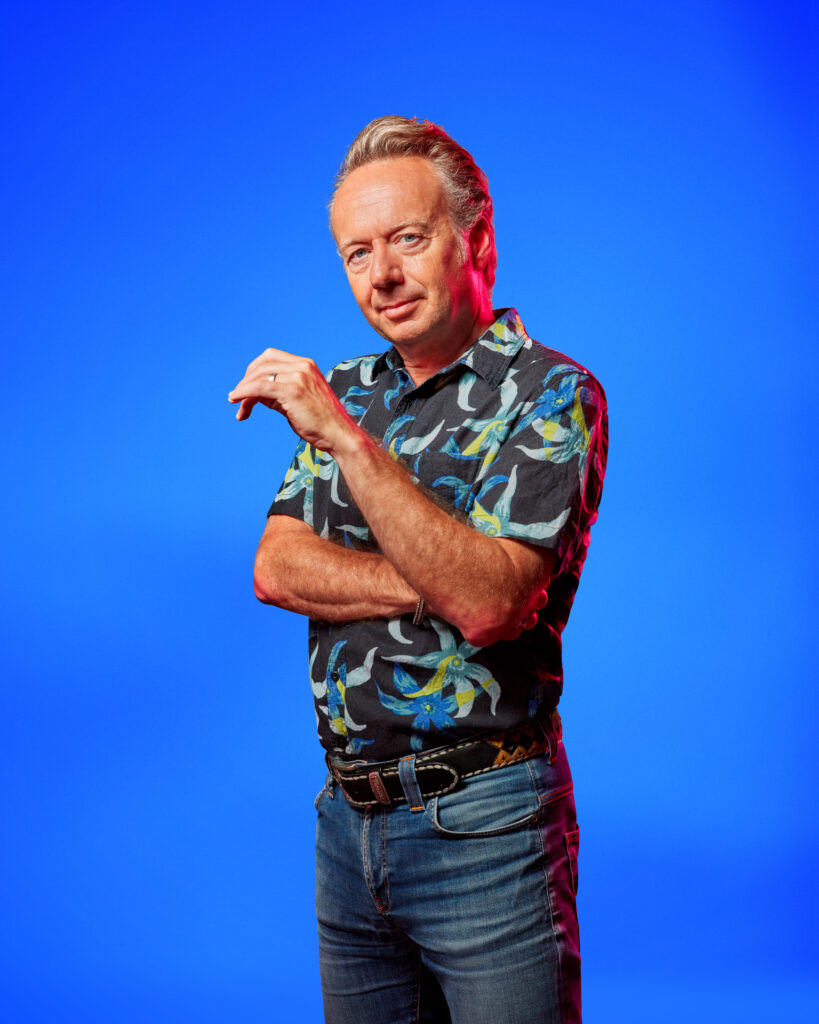
Die man was erg teleurgesteld in zijn vrienden, die het te heftig vonden om over te praten. Hij waardeerde het dat ik hem juist wél vroeg wat er was gebeurd en hoe hij zich voelde. Naderhand sprak een dj me daar op aan tijden een radio-interview, die vond dat niet kunnen. Zelf had ik het juist onbehoorlijk gevonden als ik na zo’n heftige ontboezeming had gezegd: “Ja, jeetje, nou, goede reis verder.” Het is respectloos om bij gevoelige thema’s maar gauw van onderwerp te veranderen of het maar snel over jezelf te gaan hebben.
Echt luisteren, zonder oordeel, geeft een gevoel van verbinding. Maar dat wordt steeds zeldzamer. Ondanks alle rumoer van appen en chatten is er veel eenzaamheid. Als ik in Taxi oudere mensen naar de dokter bracht, was ik soms de eerste persoon die ze die dag spraken. Door mijn oprechte interesse voelden ze zich gezien.’
Kies voor avontuur en je wordt beloond
‘Hoewel de meeste mensen me vooral kennen van televisie, beschouw ik optreden met mijn band als mijn hoofdberoep. Voor wat ik wil – raken en geraakt worden – is muziek een krachtig middel. Al op mijn 8ste zat ik zielige deuntjes op de piano te spelen, net zo lang tot ik zelf moest huilen. Lekker sentimenteel. Sinds mijn 16de treed ik op. Dat is een enorme uitlaatklep; op het podium zing ik alles van me af. Zonder televisie kan ik wel leven, zonder optreden niet.
Toen ik geschiedenis studeerde, deed ik mijn afstudeeronderzoek in Mexico. Ik werd daar verliefd op de muziek. Die teksten zijn zo mooi, de melodieën zo rijk. Later vertaalde ik nummers in het Nederlands voor mijn band Caramba. Het was altijd mijn droom om die in het Nederlands vertaalde songs ten gehore te brengen in het land van oorsprong, omdat ik benieuwd was wat de Mexicanen daarvan vonden.
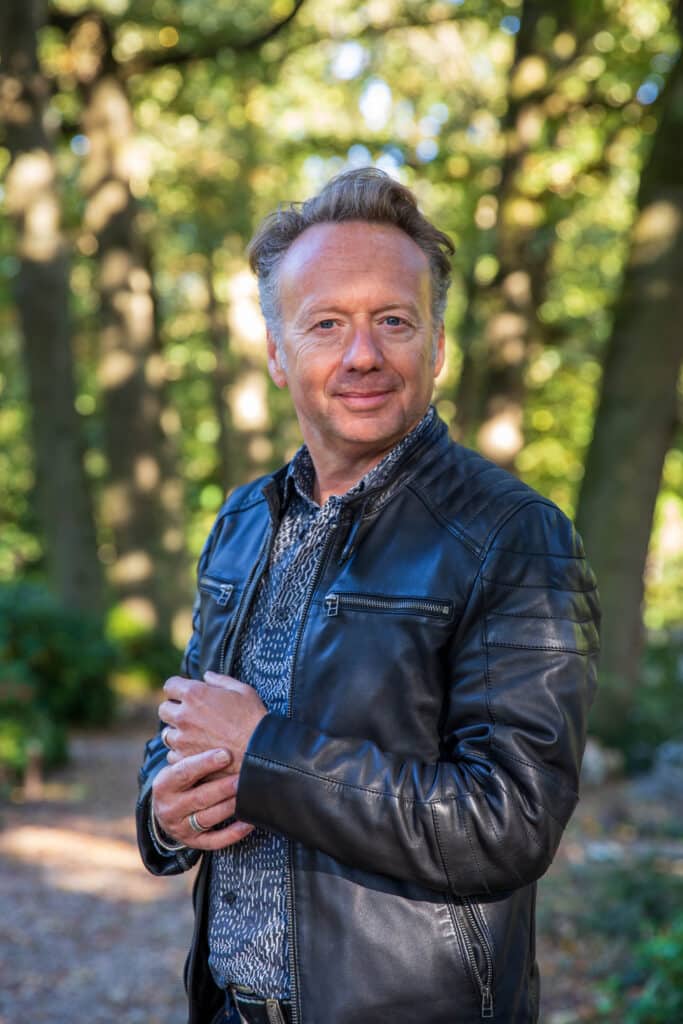
Toen het eind van de Maya-kalender in zicht kwam, in 2012, vond ik dat een mooie, heilige deadline om mijn plan om op tournee door Mexico te gaan eindelijk ten uitvoer te brengen. Het werd een magische reis, als een spannend jongensboek. We speelden op festivals en de cultureel attaché in Nederland regelde dat we in het voorprogramma kwamen van een Mexicaanse artiest, in een stadion met twintigduizend man.
Via-via had ik contact gelegd met mijn grote idool, Armando Manzanero, en we mochten ook voor hem spelen. Aan zijn gezicht was te zien dat die kleine man in tropisch pak onze bewerkingen mooi vond: hij luisterde aandachtig en zong het einde mee in het Spaans. Het nieuws dat een Nederlandse band hun grote artiest eer kwam betonen, vonden de Mexicanen geweldig, we kwamen in de krant en op tv. Wat gaan jullie nog meer doen? vroegen de journalisten. Ik vertelde dat we op de Dag van de Doden gingen spelen op het graf van mijn andere grote held, José Alfredo Jiménez. De cameraploeg besloot ons te volgen.
Twee jaar eerder was onze bassist Jeroen overleden. In het fotoboek dat we voor hem maakten toen hij ziek werd, had ik een vertaling gezet van het nummer ‘La vida no vale nada’ van José Alfredo: ‘Het leven is knap waardeloos’. En wat denk je? Op het graf van José Alfredo stond heel groot: La vida no vale nada. Dus wij speelden dat nummer op zijn graf, en dachten daarbij natuurlijk aan Jeroen. Na afloop barstten we in snikken uit. Die Mexicanen waren diep onder de indruk, want zij dachten: die mensen uit Nederland zijn veertig jaar na José’s dood nog zo bedroefd om onze nationale held.
Alles wat we deden, werd een succes. Het voelde alsof we de goedkeuring van de Maya’s hadden. Sindsdien geloof ik erin dat als je voluit durft te kiezen voor avontuur, je daarvoor wordt beloond.’
Ik heb een roedel nodig
‘Als kind hield ik van de avontuurlijk boeken van Thea Beckman en de serie Arendsoog. De hoofdpersonen waren helden die avonturen beleven, maar wel met een groep vrienden om hen heen. Dat wilde ik ook en dat heb ik gevonden. Zowel bij de televisie als met mijn band werk ik graag met dezelfde mensen, die trouw en getalenteerd zijn. Iedereen heeft zijn eigen functie, en we zijn allemaal evenveel waard.
Die veiligheid heb ik nodig. Helemaal in mijn eentje het avontuur aangaan, is niets voor mij. Dat merkte ik toen ik als 17-jarige anarchist besloot van school te gaan. In mijn ogen was school een fascistisch systeem dat ten doel had je wil te breken en je creativiteit te doden. Dus moest ik een daad stellen, vond ik. Ik gooide een rookbom door het gebouw en kondigde mijn vertrek aan.
Mijn ouders hadden zoveel vertrouwen in me, dat ze me een halfjaar de ruimte gaven om uit te zoeken wat ik wilde. Al snel ontdekte ik de consequenties van mijn besluit. Doordat mijn vrienden wél naar school gingen, raakte ik in de punk- en kraakscene verzeild. Laat naar bed, laat op, muziek maken en stappen. Leuk, maar ook lamlendig en na een tijdje nogal saai. Bovendien bleken de mensen in die kring helemaal niet zo geëngageerd als ik had verwacht. Ik voelde me alleen. Na een halfjaar wist ik dat ik helemaal niet buiten de maatschappij wilde staan; ik wilde er weer in. En haalde alsnog mijn vwo-diploma.
Het is best fijn om soms iets alleen te doen. Als we met de band voor Oerol op Terschelling zijn, geniet ik ervan om in mijn eentje te gaan zwemmen bij zonsondergang. Omdat ik weet dat bij terugkomst de hele groep bij het kampvuur zit en ik me aan hun gezelschap kan warmen. Ik ben een teamspeler, geen eenzame Don Quichot. Om tot bloei te komen heb ik anderen nodig. Als ik samenwerk met mensen die ik goed ken en vertrouw, bij wie ik me veilig voel, kom ik tot betere prestaties.’
Het grootste wat je kunt doen, is klein
‘Mijn vrouw Rebecca en ik ontmoetten elkaar toen ik 23 was en zij 20. We kwamen allebei uit een links-progressief en creatief VPRO-gezin, met veel interesse voor kunst en literatuur. Dat schiep een band. Rebecca groeide op in een pleeggezin. Zelf besloten we op een gegeven moment ook om pleegouders te worden. We wilden de veiligheid van ons gezin delen met een ander. Onze dochters waren 8 en 10 toen onze eerste pleegzoon in huis kwam. Toen hij volwassen was en op zichzelf ging wonen, kregen we een pleegdochter. Ook mijn schoonmoeder woonde een tijd bij ons toen ze heel ziek was.
Met alle vriendjes en vriendinnetjes die in en uitliepen was het bij ons thuis een enerverende en gezellige puinhoop. Dat voelde voor mij, als kind uit samengestelde gezinnen, heel vanzelfsprekend. En het was een goede relativering tegenover de wereld van Hilversum. Als ik vol verhalen thuiskwam na de opnames van Hello Goodbye, in die tijd een enorm succes, was het echt niet zo van: onze ster is thuis, nee, helemaal niet. Waar heb je die zak aardappels gelaten? En jij zou toch koken vandaag?
Samen je eigen kinderen opvoeden is natuurlijk al een grote verantwoordelijkheid, maar dit was nog extra ingewikkeld en uitdagend. Dat heeft de relatie tussen Rebecca en mij verstevigd. We praatten veel met elkaar, onder meer over opvoedingskwesties. Dat is toch wezenlijker dan over de kleur van de nieuwe bank. Daarom hebben we, toen onze dochters en twee pleegkinderen het huis uit waren, opnieuw een kind in huis genomen.
Als punkertje van 17 dacht ik dat er revolutie nodig was om de wereld te veranderen. Maar nu geloof ik meer in de kleine veranderingen. Ik hou van de uitspraak: “Wie één kind redt, redt de hele wereld.” Probeer eerst maar eens lief te zijn voor de mensen in je eigen omgeving voordat je de rest van de wereld gaat redden. Dat lijkt niks, maar juist dát maakt het verschil.’
Over Joris Linssen
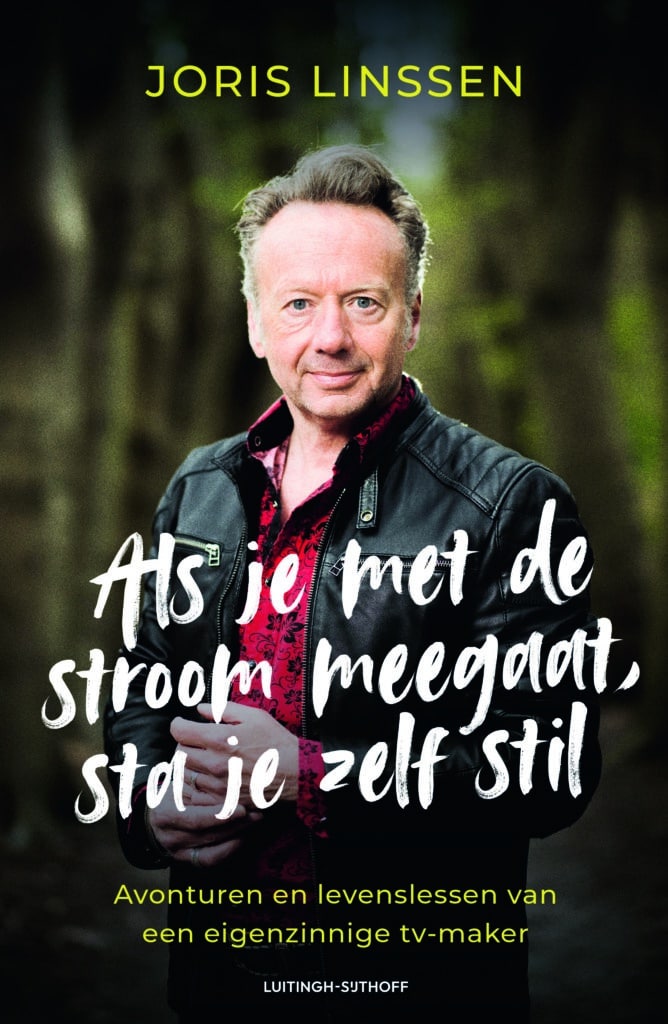
www.jorislinssen.nl
